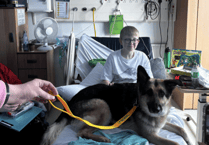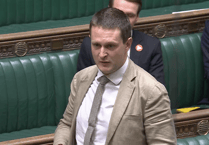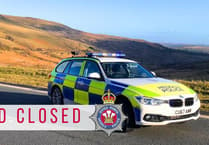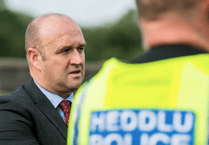IT was no fun in the sun for Brecon police officers who travelled to the British Virgin Islands to help during the horrific aftermath of hurricanes Irma and Maria.
Sergeant Owen Dillon and PC Julian Clegg were both part of the team which joined the BVI police from Thursday, October 19 to help support the islands’ police after the hurricanes which ripped through the Caribbean back in September.
Owen, 49, of Brecon Roads Policing Unit, supervised the island’s ‘D’ shift and worked as a level two police support unit (PSU) sergeant in the event of any public disorder and looting.
Julian, also 49, is a constable with the Roads Policing Unit in Brecon and worked on Owen’s shift in the BVI.
Along with three other Dyfed-Powys Police officers, Owen and Julian were part of a team of officers deployed by British police forces to assist on the disaster struck islands, which are British dependencies.
Owen and Julian were based in Road Town the capital of the main island Tortola. They had travelled with other British officers to Tortola via Barbados.
Owen said: “We flew out with the RAF via Barbados with the journey spread over two days.”
The teams of officers, who were there for a month, were the third contingency to go to the islands to help life “get back to normal” – the first two groups being described as “sheer disaster control” after the storms. Almost three months on from the deadly hurricanes, and the BVI are still devastated - the roads are completely destroyed, the telephone and radio poles were torn down and very few vehicles still have windows or functioning lights.
There have been 12 murders on the islands since January, in a population of 30,000, and only three of the BVI’s seven police stations are currently operational, with damage caused by the storms.
Owen said: “At the Road Town Police Station, where we were based, the top floor had totally blown through. The whole time we were there we had no radio communication at all because all the radio masts were blown over. There was a big sports centre still being used as temporary housing for a lot of people, along with schools which had tents set up by Unicef for the pupils without homes.”
He said that a lot of BVI police officers were staying in condemned police stations and without functioning equipment and that a lot of the houses were totally destroyed and most were without roofs.
The BVI officers were still in shock following the two hurricanes and were exhausted from working shift patterns of three days on, followed by one day off.
Like the majority of residents on the islands, local police officers’ houses were either totally destroyed or badly damaged. Many officers have had to send their children to other countries for school.
Owen said: “They were completely exhausted, both mentally and physically, and shattered by the workload. It was very much out of sync with their usual duties and shift pattern - they were very disorientated.
“By being there we could take some pressure off and it meant they could have some time off to recover from what they had been through.”
While in the BVI the officers had to get used to a different way of policing, including some different laws and dealing with the constant threat of firearms and illegal weapons which Owen described as being a “culture shock” to some British officers.
While traffic officers and Owen’s shift continued to carry out stop checks on cars to maintain road safety, officers weren’t stopping partially destroyed cars as most vehicles had been damaged during the storms, including police vehicles. The governor had given grace until December 1 for certain road offences to give people time to carry out the necessary repairs.
Talking about the work with local officers, Owen said: “It took a while to understand each other, and by the end we were working as a team. We were mentoring them – I had two detectives working with their CID officers. We could use our expertise to assist them. We had to develop a more understanding way of working while we were arresting people.
“We learned how to work together and to understand the fact we were there to help, not to take over.”
One of the bigger issues which they faced was that the court buildings had been destroyed, making it more difficult to prosecute those who had been arrested.
Owen said: “A lot of the people we arrested had to be given long bail dates or dealt with in a different manner because there were no courts to put them in front of.
“The islands operate under the old Judges Rules and does not have the Police & Criminal Evidence Act (PACE) which is our bread and butter here. It took some time to get used to the different application.”
During the deployment there was a case involving high level drug traffickers and a suspected murderer and a judge had to be flown in to hold special court sittings. UK officers worked with local officers and firearms officers from the Cayman Islands and Bermuda to provide security at court and back to the prison.
Another problem which presented itself to the officers was drug trafficking and gangs, specifically around areas like Carrot Bay.
Police had to target who they were going to target, working with the local intelligence officers. One of the gangs which they saw, who often had mopeds plastered with gang stickers, was the Zone Six Gang.
One of the more harrowing accounts which Owen recalled was on a day when the officers had patrolled at a large boat show at Nannacay, which ended with them attending a dispute between two homeless men.
He said: “Later in the shift we ended up dealing with two men who were fighting over the last dry spot in a derelict building, and one of them had a large shard of glass. We ended up having to pepper spray the one and knock the shard out of his hand with a baton. Over the course of that shift we had dealt with such a range of people from different lifestyles - from multimillionaires to a couple of homeless men. Obviously there was drunkenness and mental health involved with these men, but ultimately they were arguing over the last dry spot where they could spend the night.”
The Road Policing officers assisted in enforcing the 11pm curfew during their road checks, which Owen said took a lot of work to set up and monitor. As a result they seized a number of items, including illegal weapons, controlled drugs, uninsured vehicles, and arrested drunk drivers.
The rest of the community, who the officers took the time to support, received the British officers very positively.
Owen said: “We had high visibility jackets for the curfew checks, and by wearing these on the roads while carrying out these checks we were able to raise confidence among the community. They were happy to see police out late at night. We had fantastic public support - I think it was just reassuring for them to see British police helping with high-vis jackets.”
The British officers were split into four teams on the islands. One Dyfed-Powys Police officer was on the training team, carrying out officer safety training including conflict management.
Owen’s team, which was supporting Code D, had two Road Policing sergeants, two Road Policing officers and two detectives.
He said: “We were able to work with their officers. My road traffic officers worked with theirs, and my detectives worked with theirs and mentored them. We have the skills and the ability which we are able to pass onto other officers. It shows you how lucky and well trained we are in this country - we are blessed that we can learn constantly from other forces and improve from their experiences. There, the police are isolated and not able to learn like that.”
The brave officers stayed at the Treasure Isle Hotel which was badly damaged and without a roof with mostly three people per room.
Owen said: “We were on campbeds with mosquito nets over them, and there was no air condition for most of us so we had some fans between us.
“There were no facilities, apart from running water and electricity which had been restored, and there were holes in the roofs, which caused some flooding when it rained. At the same time, it was better than what the people who live there had as they either had really badly damaged homes or no homes left at all.”
The ex-marine, who has previously been deployed on operational tours with the military and the police, said that it was a bit of a shock for some of the people on the trip who, unlike former-military members, had never experienced those sorts of living conditions before.
He said: “One thing I was able to bring to the table was that I was an NCO, and I was used to organising and managing operations.”
During the time the officers were in the BVI, some officers spent their rest days and spare time helping with the local and aid organisations such as Team Rubicon, Convoy of Hope, The Red Cross and Unicef.
Any equipment they were unable to bring back to the UK, such as uniforms and fans, was either donated to the police or one of the organisations. The cooking resources were limited in the hotel, and the donations included two barbecues which had been used during the deployment.
Owen said: “The joke was that we were eating rice, bones and veg. It was fairly basic – meat on the bone, although the chef was amazing. We all ate well but nothing fancy mind because the hotel needed to be rebuilt while we were there.
“We didn’t have much in the way of tea or coffee, we were just living off water because of the extreme heat. I had my first coffee after two weeks in a little French deli when the cafes were starting to pop back up.”
The officers did struggle with the heat and humidity as they struggled to acclimatise to the different weather conditions. They were apparently thankful for some of the rainy days as it gave them a break from the heat.
Other Dyfed-Powys officers in the BVI were PC Matthew Richards, who was put in the training group, and PC Elinor Evans, who impressed the inspector with her “example” role during a search warrant of a property. PC Paddy Dewaine, from Pembrokeshire, also provided a lot of expertise in roads policing and also carpentry during the aid work.
Owen said: “The professionalism shown by my team, including from the South Wales and the Lancashire forces, was an example of the best of British policing. By the end we were fairly tired, but it’s been good and we’ve developed some good contacts.
“At some point, we will be meeting some of their officers who have a pre-planned visit to the UK. It’s a lasting thing – I’m already in touch with some of them via social media.”




